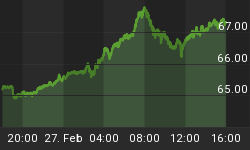John Rubino of DollarCollapse.com and FRA Co-founder, Gordon T. Long discuss the effects of the rise in eCommerce along with the rise of technology and the consequences we are facing from flawed perceptions of financial authorities.
John Rubino is author of Clean Money: Picking Winners in the Green Tech Boom (Wiley, December 2008), co-author, with GoldMoney's James Turk, of The Collapse of the Dollar and How to Profit From It (Doubleday, January 2008), and author of How to Profit from the Coming Real Estate Bust (Rodale, 2003). After earning a Finance MBA from New York University, he spent the 1980s on Wall Street, as a currency trader, equity analyst and junk bond analyst. During the 1990s he was a featured columnist with TheStreet.com and a frequent contributor to Individual Investor, Online Investor, and Consumers Digest, among many other publications. He now writes for CFA Magazine and edits DollarCollapse.com and GreenStockInvesting.com.


The big retail chains are generally seen as pretty good barometers of the health of "the consumer." And since -- in today's late-cycle debt-binge pseudo-capitalism -- the consumer drives the economy, the numbers coming out of the aforementioned retail chains should be cause for worry. Ecommerce companies like amazon are making it easier and easier to stay at home. Women now are more and more buying their clothes from the comfort of their homes which will soon make the need for malls obsolete.
Furthermore by increasing the minimum wage rate in America, all of the fast food chains have begun automating cashiers with kiosks. McDonalds' has already begun doing this and this new direction has highlighted the lesser need for human labor within the retail sector. Warehouses and factories used to employ many people throughout the world, now with the rise of technology, and particularly in America these places have become vastly automated. In many cases you do not need bartenders, waiters, and cashiers. All of these tasks can be automated through technology.
"I hate to be apocalyptic but the fact of the matter is we have multiple storms that are all playing in the same direction and they are feeding on each other as a link. To link monetary policy and cheap money to robotics. If you are a CEO and money is this cheap, you are going to invest into robotics. These trends have accelerated the shift to robotics and this wave is going to shock people and leave many without jobs."
Monetary Policy
When interest rates are low it is a signal to the market to borrow lots of money. Over the past couple of decades due to these low interest rates, the businesses of the world have begun mass borrowing of money to build factories. This mass overcapacity in turn leads to deflation. for example when you build too much steel you cannot just stop operations at the given plant; the plant must continue to run to at least break the variable cost, which in the long run drops the price of steel.
"Deflation is a direct result of our attempts to create inflation through easy money."
Cheap money was not going to bring demand forward any more than two years, but what it would do is create a dramatic over supply. We have had $9 trillion leveraged into the emerging markets that basically went into fueling overcapacity for the past several years. When you get overcapacity you lose price power and then cash flows begin to be depleted. This was easily predictable, there was no economist that would say otherwise, however the mistake was that they thought we had some sort of recovery happening or they ignored that and thought Japan had the right approach.
"The people making high level financial decisions the past decade are clueless. They have no idea what the consequences of their decisions are. The people in charge now are getting exactly the opposite of what their predecessors expected when they implemented QE, and ran massive government deficits."
This is going to force another wave of major layoffs. We already have a gutted middle class; we are killing the golden goose that actually buys consumer products. Maybe what was really missed is that all of this economics was based on a standalone country. We live in a globalized economy now that has labor arbitrage, and the central banks have underestimated the global impacts of these policies.
"We are at the point where there are no more options. Anything we do from now on will have some sort of unintended consequences that will come back to bite us."
The Japanese Central Bank and the ECB both took steps to devalue their currencies and they got the opposite result; the currencies went up. If we have gotten to the point where all the emergency measures central banks implement do not seem to work then it can't be interpreted as a sign that we are coming or have come to the end of this process.
The New Narrative

"The narrative has now been shifted to a massive move of increasing central banks' balance sheets that will be based on fiscal spending of infrastructure."
James Rickards in his new book, 'The New Case for Gold' argues that to get the dollar down and force inflation into the system a way to do it is for the government to drive up the price of the gold. The enemy of the government has been gold, but it can also be the friend of the government in a crisis situation. Similarly, Catherine Austin Fitts argues the 1% has sucking wealth out of the US society for the past few decades and they have basically stolen just about as much as they think they can steal. Now it is in their interest to go back to sound money to protect what they have stolen. This is another reason for the gold standard to eventually look useful to the people in charge.
Abstract by: Karan Singh
Video Editor: Sarah Tung















